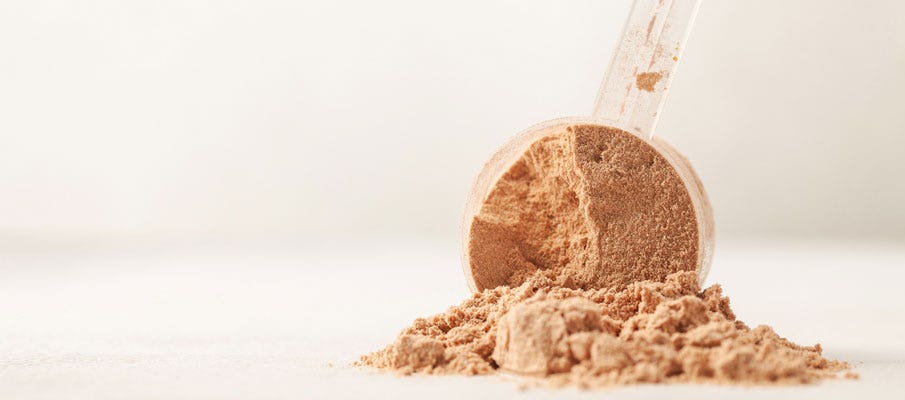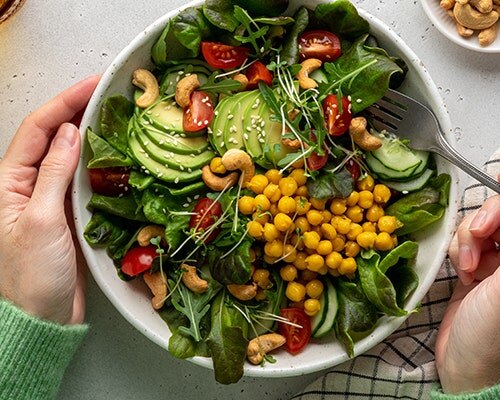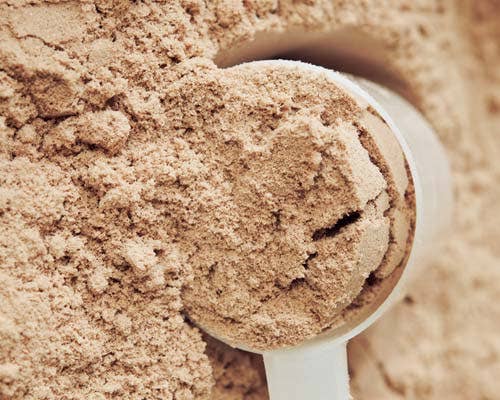How to Choose a Plant-Based Protein Powder
- 7/10/23


One of the most commonly consumed supplemental products today is protein powder. Many people have a container of protein powder on their kitchen shelf right now, perhaps using it to support their workout routine and body composition goals or to boost nutrition in smoothies.
With the large demand for protein powders, there’s no shortage of options. In addition to the many flavors available, they are made with various protein sources. Originally, dairy-based protein powders made with whey protein were one of the only options, but now plenty of plant-based protein powders stock store shelves, too.
How do you choose a good plant protein powder? What are they made from, and what are some of the best ways to use them? We’ll answer these questions and more below.
What is Plant-Based Protein Powder?
Plant-based protein powder is an animal-free powdered protein supplement. It’s made by extracting protein from a food source, such as soy, pea, rice, or hemp, and then drying it into a powder. This creates a concentrated dose of protein that can be used in various ways, depending on the individual’s goals and preferences (not just vegan protein smoothies!).
The most common types of plant protein powder include:
- Hemp
- Soy
- Pea
- Rice
- Blends of two or more of these
Many other plant protein blends use things like cranberry seed, pumpkin seed, beans, chia seeds, and lentils as well.
Benefits
One of the biggest benefits of plant protein powders is that they provide an animal-free option for people who want a concentrated protein supplement to complement their diet. Most plant powders contain a valuable amount of protein, generally ranging from 15-30 grams per serving.
Additionally, plant protein powders offer the following benefits:
- Suitable for use by anyone who needs a concentrated source of protein, not just athletes or bodybuilders
- It can be used to help support healthy weight management
- Protein can help maintain healthy blood sugar levels and satiety between meals
- It can be used to help support body composition goals
- Contains fiber, which is only found in plants and may help support digestive health
- More ethical and sustainable for the environment than animal protein
Common Misconceptions
With the widespread use of plant-based protein powders come many misconceptions about using them and what they can do for you. Let’s clear some of those up.
- Protein powders are meal replacements.
Although protein powders can contribute protein, fat, carbs, and various vitamins and minerals — with some even containing extra fiber, prebiotics, probiotics, and other plant compounds — they are not meant to be a constant replacement for actual meals.
These powders are not a substitute for whole plant foods, including fruits, vegetables, whole grains, nuts, seeds, and legumes. They are rather a supplemental form of nutrition to complement an already healthy and balanced diet.
- They will make you gain weight or bulk up too much.
Protein powder, and any macronutrient in general, do not cause weight gain or bulking by themselves. Eating an excess of calories beyond what your body needs and uses will promote weight gain.
Protein powder can be used as a dietary tool to help support body composition goals, whether that’s weight gain, weight loss, or muscle building. Most people have no problem meeting (and exceeding) their daily protein needs through food, but if a quick extra protein source is needed, like with vegetarian protein shakes, protein powders offer a nice variety.
- Soy protein is unhealthy.
While soy isn’t the only plant protein powder, it’s one of the most commonly used ingredients. Soy is among the most controversial foods on the planet, with many people concerned that eating too much soy will promote negative health outcomes.
What’s the truth? Soy contains isoflavones, the compound at the center of the soy controversy due to their ability to act like estrogen. However, isoflavones in soy have been shown to have health-protective effects.
While the most health benefit comes from eating minimally processed soy foods like tofu or tempeh, non-GMO, Certified Organic soy protein powders are okay in moderation but for the biggest health benefits, choose a blend of peas, beans, lentils, brown rice, cranberry seeds, chia, pumpkin seeds and more.
Choosing the Best Plant-Based Protein Powder
When you’re perusing the aisle of plant protein powders, consider the following tips to help you narrow down the best one for your lifestyle and goals.
- It has been third-party tested to ensure purity, quality, and safety
- It has a short ingredient list without a bunch of items you can’t pronounce
- Free from artificial dyes, flavors, and sweetening agents
- Contains no more than 5 grams of sugar per serving
- The product is made with sustainable manufacturing practices
- The brand has a positive reputation and is well-established
- It contains at least 15 grams of protein per serving
- Opt for non-GMO and certified organic whenever possible
How to Use it
There’s no right or wrong way to use protein powder, as everyone has different needs and preferences. Different flavors may work better for certain uses than others. These powders can be incorporated into recipes or blended into a protein shake. Need ideas? Here are some ways to use it:
- Added to a berry and greens smoothie
- Mixed into pancake or waffle batter
- Stirred into oatmeal or a yogurt bowl
- Blended into protein snack balls
- Used to make post-work-out vegetarian protein shakes
Plant-based protein powders are a convenient way to add an extra serving of protein to your routine, should you need it for your health and lifestyle goals. Compared to their animal-based counterparts, plant protein powders offer a more sustainable and ethical option for plant-based consumers, while providing a similar amount of protein per serving and coming in multiple flavors.
Garden of Life offers an extensive line of plant-based protein powders made with protein blends that use things like peas, beans, lentils, cranberry seeds, chia, pumpkin seeds, and more. They come in chocolate, vanilla, unflavored, and slightly sweetened varieties.
Plus, Garden of Life protein powders carry an array of consumer-facing certifications. For example, many of them are NSF Certified for purity and quality, Non-GMO Project Verified, USDA Organic, or carry an Informed Choice or NSF Certified for Sport label that indicates their clearance for competitive athletes.
References
-
Nakai S, Fujita M, Kamei Y. Health Promotion Effects of Soy Isoflavones. J Nutr Sci Vitaminol (Tokyo). 2020;66(6):502-507. doi:10.3177/jnsv.66.502




